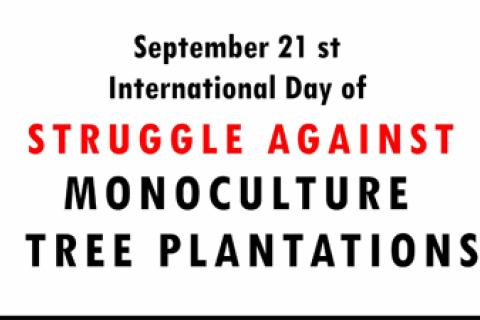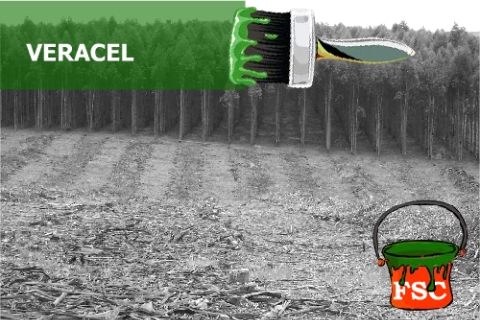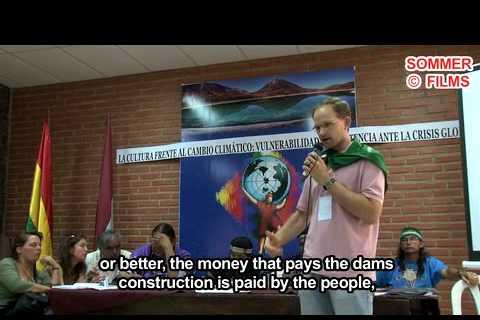“The forest dependent people of India are raising their voice strongly against the loot of natural resources in the name of delivering development, saving the environment and combating climate change. They are bringing forth the issues of people’s political economy of protection of natural resources and protection of livelihood vis-à-vis the elite and capitalist interests on the natural resources.
Other information
For local peoples, tree plantations ar jails. September 21st, International Day of Struggle against Monoculture Tree Plantations
-
Local communities opposition? Use FSC and give a perfect finish to your plantations!
-
Kemenyan or locally known haminjon is a fragrant resin of benzoin. It has been cultivated and traded from Batak highlands of Indonesia's province of North Sumatra for centuries. Benzoin is produced from benzoin trees (Styrax benzoin) and is highly valued as ingredient in incense for burning in rituals ceremonies, for traditional and modern medicinal purposes, perfumery and for fragrant cigarettes.
A new negotiation round on climate change under the UN Climate Change Convention (UNFCCC) ended in Bonn on August 6.
The protracted UNFCCC process which is crucial for the future of Humankind has become a very complex scenario full of technicisms and rather difficult to follow by non “experts”. The main danger of such a tangled structure is that it hides vested interests, powerful lobbies, bullying attitudes and unilateral decisions from the more powerful sectors and countries.
Faced with greenhouse gas emissions at every stage of the production chain, the timber industry has a choice. It could look at reducing emissions. Or it could attempt to greenwash its operations, in effect attempting to evade responsibility. Perhaps not surprisingly, given its record, the industry is opting for the latter.
Norway is a major donor of the Amazon Fund, the Brazilian Development Bank’s fund that receives donations from governments, multilateral institutions, big NGOs and companies to fund forest conservation projects with the alleged aim of reducing emissions of greenhouse gases resulting from deforestation. The contribution of donors is recognised with diplomas that are nominal, non-transferable and do not imply equity rights or carbon credits to offset.
Reaching the 32 Quilombola communities in the Sapê do Norte region of the state of Espírito Santo, located in the municipalities of São Mateus and Conceição da Barra, can be extremely challenging. On the vast plain that comprises this northern edge of the state, where the monotonous and homogenous landscape is comprised almost entirely of eucalyptus trees, there are very few landmarks to point the way.
The oil palm is native to this and other countries of the region, where its sap is collected to make palm wine, its dates used in cooking oil produced in cottage industries. The product was traditionally exported before the establishment of plantations, that by 1968 covered some 7,000 hectares. The seedlings planted originated from more productive varieties developed in Asia. Although those plantations were abandoned, they continue to produce some bunches, similar to those of the native palms, for family consumption.
The FAO insists on the increasingly difficult mission of defining tree plantations as “planted forests.” Its latest contribution to this aim is a publication titled “Planted forests in sustainable forest management — A statement of principles”.
The document states that “FAO further adopts an important role in facilitating an informed public debate about the controversy of planted forests and in supporting major stakeholder groups, including the public, to better understand the role of planted forests in integrated ecosystem management and sustainable development.”
The Association for Tropical Biology and Conservation -a large world professional society on tropical forests- has recently made public a resolution “urging the United Nations to alter its potentially misleading forest definitions”. The resolution states:
“WHEREAS, the current definition of ‘forest’ used by the United Nations fails to distinguish between natural forests, modified natural forests, and tree plantations; and
IControlled by the Indonesian Widjaja family, the Sinar Mas group is one of the largest conglomerates in Indonesia engaged in clearing rainforests and destroying peatlands for their several bussinesses, including the pulp and paper industry through the Sinar Mas’ pulp and paper division, Asia Pulp and Paper (APP).



